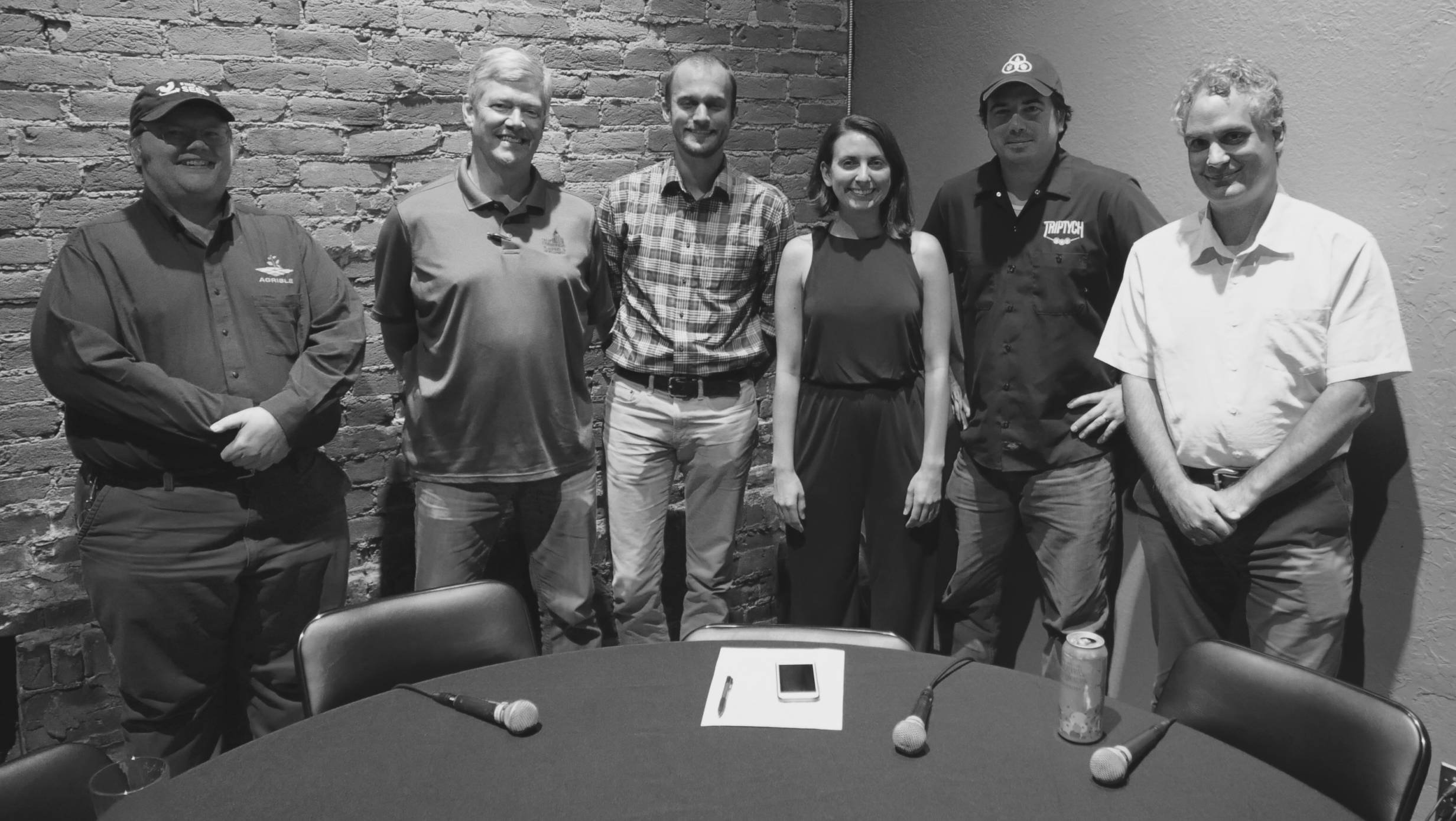Water is a precious resource, but to those of us here in the flatlands, it often means flooding. We tend to spend lots of time thinking about how to get rid of water and less time considering how we can conserve it or play up our access to it. Last Friday’s Round Table at The Accord, which featured five speakers who work with water in different capacities, invited a new perspective on water in C-U.
The panel featured Paul Miller, the chief science officer of Agrible, a Research Park company focused on creating big data applications for the agriculture industry; Bruce Knight, the planning and development director for the City of Champaign; Andrew Rehn, a water resources engineer from the Prairie Rivers Network, an environmental advocacy group; Anthony Benjamin, Triptych Brewing’s owner and brewer; and Andy Stumpf, a geologist with the Illinois State Geological Survey.
This Round Table topic was inspired by a recent conversation with Bill Sullivan, a professor of Landscape Architecture. Sullivan pointed out that here in C-U, we often think about water in terms of drainage, or “how to get rid of it.” Changing our orientation to water, Sullivan suggested, would involve treating it as a resource rather than a nuisance.
Knight said that during his time in leadership, he has seen this shift begin to take place, in part due to lessons C-U has learned from other communities. “The Dutch have a very different mindset about water,” he said. “They say to invite water in and make it part of your community rather than try to fight it. As a community, we’re moving in that direction.”
At the same time, Knight pointed out addressing flooding has had an enormous effect on C-U’s landscape. He remembered that when he first arrived in Champaign-Urbana in 1988, Campustown would flood every two years or so. “There are pictures of people canoeing down Green Street,” he said. Since that time, the City of Champaign has spent roughly $80 million to make sure that the city is not an active floodplain. “Many of the high-rises you’re seeing built around Campustown are a result of the fact that developers don’t have to worry about flooding now,” said Knight. “Regardless of what you think about those buildings, the city’s investment in managing stormwater has had a huge economic impact on our community.”
Miller also focused on the particularities of access to water in C-U. He pointed out that water is in abundant supply in our community, and we’re fortunate enough to have soil that can retain it well. Many of Agrible’s products are designed for farmers in areas of the country that have a more fraught relationship with water; they are designed to help growers improve irrigation efficiency as well as understand how water changes soil composition. He highlighted the irony of the fact that as a country, we get a large percentage of our vegetables from California, a severely drought-stricken state. “In the next ten years, I hope we begin to see more varied agricultural production here locally, which would have huge implications for sustainability and the economic landscape of our community,” he said.
Benjamin also compared C-U’s access to water to what other areas of the country experience. In C-U, he pointed out, water is artificially cheap because it’s supplemented by tax dollars and federal funding. “Out west, that’s not the case,” he said. “As communities in Western states look to address their problems with water, they always look east, and eventually they’re going to get to us.” He advised thinking in terms of water conservation even though we have a lot of access to water.
Water is a major input and output of beer production; in fact, it’s 95% of a can of beer. In his comments about clean water, Benjamin observed that brewing practices developed in a time when a lot of water was unsafe to drink. “Today, I couldn’t boil away the shit that’s in our water,” he said, noting that city planning affects whether and to what extent street pollution makes its way into the water supply.
Rehn noted that individuals can also make choices in terms of water conservation and sustainability. Planting rain gardens or participating in Boneyard Creek cleanup days are ways we can reduce the impact of pollution on our local water. He said that he hopes people will continue “to see and appreciate nature, because otherwise, we’ll never value it.”
Stumpf also emphasized that C-U should appreciate its access to water, specifically in terms of the Mahomet Aquifer. “If we didn’t have the Aquifer, C-U could not be such a large community,” he said. He hopes that water conversation will increasingly be part of our community conversation about water in the coming years.
The panel discussion shed new light on how we could think about water, both now and in the future. Stay tuned for the next Round Table discussion, which will take place in July.








